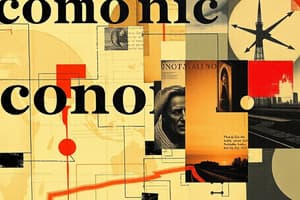Podcast
Questions and Answers
What does the word 'economics' derive from?
What does the word 'economics' derive from?
The Greek words 'eco' meaning home and 'nomos' meaning accounts.
Which of the following statements best describes a standard definition of economics?
Which of the following statements best describes a standard definition of economics?
- It is a study of politics.
- It is primarily concerned with investment strategies.
- It is focused only on national income.
- It is a social science aimed at satisfying needs and wants through allocating scarce resources. (correct)
Define economics.
Define economics.
A social science that seeks to analyze and describe the production, distribution, and consumption of wealth.
Which branch of economics studies individual agents within the economy?
Which branch of economics studies individual agents within the economy?
What is the basic economic problem?
What is the basic economic problem?
What type of scarcity occurs when a resource is completely depleted?
What type of scarcity occurs when a resource is completely depleted?
What questions arise from the basic economic problem?
What questions arise from the basic economic problem?
What does relative scarcity refer to?
What does relative scarcity refer to?
Flashcards are hidden until you start studying
Study Notes
Definition of Economics
- Derived from Greek words "eco" (home) and "nomos" (accounts), it evolved from family budgeting to a broad social science.
- Defined as the analysis and description of production, distribution, and consumption of wealth.
- Notably described by Alfred Marshall as a study of mankind's ordinary life, focusing on material requisites for wellbeing.
- Lionel Robbins defines it as the study of human behavior in relation to scarce means and varying ends.
Core Concepts
- Economics centers on satisfying needs and wants through the allocation of limited resources with alternative uses.
- It examines scarcity and choice, reconciling unlimited wants with limited resources.
- Provides insight into resource costs and consumer benefits within communities.
- Concerned with coordination resulting from specialization in economic activities.
Branches of Economics
- Microeconomics:
- Studies decision-making by households and firms and their interactions in specific markets.
- Focuses on actions of individual agents like households, workers, and businesses.
- Macroeconomics:
- Examines economy-wide phenomena, looking at the economy as a whole.
- Explores broad topics such as production growth, unemployment rates, inflation, government deficits, and trade balances.
Microeconomic Issues
- Analyzes household budgeting and spending behaviors.
- Investigates combinations of goods and services that meet consumers' needs within budget constraints.
- Examines labor decisions, including full-time versus part-time work.
- Explores saving versus borrowing decisions for future needs.
- Analyzes firm production decisions including product quantity, pricing strategies, hiring practices, and financing options.
Macroeconomic Issues
- Investigates factors determining economic activity and overall production levels in a society.
- Explores job availability and national living standards in relation to economic conditions.
- Examines causes behind economic fluctuations, firm hiring practices, and long-term growth factors.
The Basic Economic Problem
- Centers on the concept of scarcity, stemming from the challenge of fulfilling unlimited wants with limited resources.
- Scarcity: A fundamental economic issue arising from the disparity between finite resources and infinite desires.
Types of Scarcity
- Absolute Scarcity:
- Occurs when a resource is completely exhausted and cannot be replenished, e.g., extinct species.
- Relative Scarcity:
- Happens when resources exist but are insufficient to meet demand, influenced by regional geographic and climatic conditions, e.g., water scarcity in certain areas.
Economic Decision-Making
- The fundamental economic problem raises three critical questions for societies:
- What should be produced?
- How should it be produced?
- For whom should it be produced?
- Societies must determine solutions to these questions based on their scarce resources.
Studying That Suits You
Use AI to generate personalized quizzes and flashcards to suit your learning preferences.




